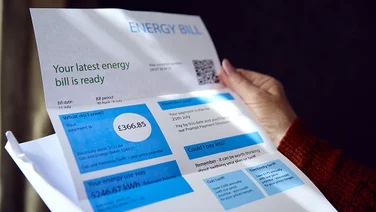- Donald Trump’s raft of tariffs threaten energy prices in the US and beyond
- The UK is not been hit yet, but could still suffer if trade war escalates
- Low carbon tech and incremental improvements are the best way to protect your pockets

Donald Trump’s second term as US president has so far been predictably alarming for renewable energy, and pretty much everything else.
As well as repealing landmark legislation designed to encourage use of low carbon technology and protect the environment, Trump has initiated trade wars with almost all of the US main partners, including the UK.
At the time of writing, Trump has imposed 20% tariffs on goods from China, 25% tariffs on most imports from Canada and Mexico and a 25% tariff on all steel and aluminum, regardless of where its comes from.
As of 2 April 2025, Trump has enforced 10% tariffs on all goods from the UK as well, which is perhaps most surprising of all as there is a relatively small trade imbalance when compared to the other major countries that have been hit.
Goods and services from the UK account for just 2% of US imports, compared to the EU, which accounts for 17%, Mexico – 15.9% -, Canada – 14.3% -, and China – 10.9%. This means tariffs on the UK hypothetically would have very little benefit for competing US industries.
However, all this risks major supply chain chaos and spikes in energy prices.
Households in the UK have seen their energy bills fluctuate in recent years, and the current Labour government has pinpointed renewable energy as the way to keep bills down long term.
We’ve taken a look at whether Trump’s isolationist economic policies threaten energy bills in this country and asked how households here can ‘Trump-proof’ their energy bills against the US president.
Why has Trump announced tariffs?

Trump’s strategy of imposing tariffs is nothing new, especially those on China, where he has resumed a trade war that dominated his previous administration from 2017-2021. China has reciprocated with tariffs on US goods.
While it probably is not surprising that he was once again taken aim at Beijing, the world has been taken aback by hard line towards other major economies.
Trump says has imposed tariffs on Mexico due to a supposed immigration crisis, mainly on the US-Mexican border and on Canada because of fears the poisonous drug fentanyl is being imported into the country from Canada.
The tariffs on China are in response to what the White House calls the country’s “intellectual property theft, forced technology transfer and other unreasonable behaviour”.
Alongside this bluster is the big issue of trade deficits, the term when a country buys more than it sells. The US has by far the biggest overall trade deficit of any country in the world at approximately $773.4 billion, something Trump wants to change.
Will Trump’s tariffs make energy more expensive?

If we were in the US, the answer would probably be yes. Simply put, if you live in the US, it’s very difficult to ‘Trump-proof’ your energy bills, at least in the short term as the US would import less from abroad.
Canada accounts for 52% of the US’ crude oil imports, and Mexico about 11%.
This probably explains why while Canada has been hit with tariffs worth 25%, duties on energy imports from the country are limited at 10% for now.
Trump plans to ramp up oil and gas exploration in the US to make it less dependent on importing from abroad and to control inflation.
But he has put blocks in the way of importing oil without first making sure consumers have plenty in reserve and he has also risked destabilising the price of energy, the very thing he promised to contain.
The nonpartisan organisation The Atlantic Council says US production of crude oil will not replace the shortfall caused by tariffs on Canada, and it predicts that energy prices will spike in regions that import Canadian oil, such as the Midwest.
“In many US markets, such as states in the US Midwest, there is no alternative to Canadian oil imports, so the inflationary impact will be immediate and likely proportional to the size of the tariff,” the organisation said.
US green pressure group the Sierra Club has accused Trump of putting “even more pain on American families” saying his “expensive trade war” will “hurt workers and consumers”.
Trump has also ditched initiatives meant to help the US renewable energy sector, meaning US households will most likely be dependent on more expensive fossil fuels for the time being.
Will Trump’s tariffs affect UK energy bills?

Possibly not right away, but there is a danger the UK could be hurt.
As the UK’s economy is heavily dependent on importing goods and energy, and is intricately intertwined with international markets, it is vulnerable to global instability.
The Office for Budget Responsibility (OBR) wrote a report in 2022 in which it predicted that an all-out trade war between the world’s major economies would sink UK GDP by 5%.
A separate report from the National Institute of Economic and Social Research suggested that a 10% tariff on all goods and services going to the US, including from the UK, would make the sterling lose up to 15% of its value against the US dollar.
This would make it harder for the country to buy energy and much else from abroad and push up energy prices.
The likely inflationary effect in the US will also make it less likely that the Federal Reserve will cut interest rates in the US, and this will discourage other central banks, including the Bank of England, to do so as well.
If this all sounds as if it could affect your wallet, it could, and this should get you thinking how you can ‘Trump-proof’ your energy bills.
How can I ‘Trump-proof’ my energy bills?

If you’re worried about your energy bills, the news about Trump’s aggressive economic policies are unlikely to make you feel better.
However, while we all may be vulnerable to huge geopolitical events beyond our control, there are some things we can do to ‘Trump-proof’ your energy bills.
- Use smart technology – potential yearly energy saving: £60
This could be a smart plug or smart meter that you can use to monitor your energy usage and find ways to cut back where you are losing money. You can even control your energy usage remotely with your phone.
- Draught proofing – potential yearly energy saving: £95
This can be as simple as using adhesive tape to fill gaps where air is getting into your house. By draught-proofing your windows and doors you can save about £40 a year, and if you do the same with your chimney you can cut back your energy bills by a further £55.
- LED lightbulbs – potential yearly energy saving: £40
Lighting accounts for about 15% of your electricity bill, and going LED can save £75 over the lifetime of a single bulb.
- Insulation – potential yearly energy saving: £200
Insulating your loft can have huge long term gains, as it will keep heat in during the colder months, meaning you can keep the thermostat down instead of turning up your heating.
- Be aware of Vampire Energy – potential yearly energy saving: £146
This is a term used for turning off appliances when you’re not using them, which means you save money without even realising it. This could be anything from lights to your printer, or turning your TV off instead of leaving it on standby, basically anything that is plugged into a socket.
- Install solar panels and other low-carbon tech – potential yearly energy saving: 70% of current energy bill
However, the best way to ensure you pay less in the long term is to produce your own energy and to future-proof your home with low-carbon technology, such as solar panels, heat pumps and EVs.
Solar panels can cut your energy bills by anything between 50-70% a year, and you can break even on your investment in just 15 years; they even make your house more valuable if and when you choose to move.
UK government initiatives such as the Smart Export Guarantee mean you can sell excess solar energy back to the National Grid.
If you’re worried about the upfront costs of solar panels, there are government grants that can help.
As far as heat pumps are concerned, they help you heat your home and hot water in a more eco-friendly way.
While you won’t necessarily save money by replacing your gas boiler with a heat pump – electricity is currently four times more expensive than gas – when that changes, and more renewable electricity comes onto the grid, you will be in a position to benefit.






